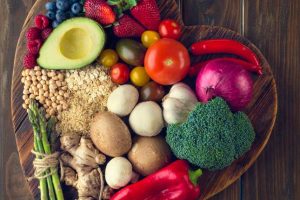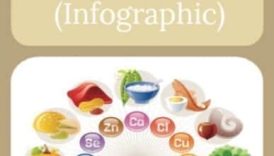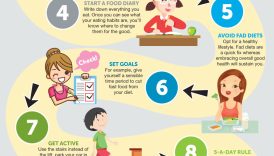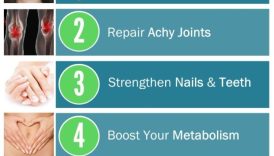Boost Your Wellness with These Key Ingredients in Your Diet

Maintaining a balanced diet is essential for achieving overall wellness and optimal health. Many individuals often find themselves overwhelmed by the plethora of dietary advice available. The good news is that by incorporating a variety of vitamin-rich foods, essential fatty acids, lean proteins, and hydrating fruits and vegetables, anyone can cultivate a healthier lifestyle. Eating well can sometimes feel like a daunting task, but it doesn’t have to be. For instance, when Jane decided to revamp her diet, she began to notice significant changes in her energy levels and overall mood. Instead of just focusing on weight loss, she concentrated on the nutrients she was putting into her body.
- Boost Your Wellness with These Key Ingredients in Your Diet
- The Importance of Nutrient Diversity
- The Path to Wellness
- Vitamin-Rich Foods for Overall Wellness
- Citrus Fruits
- Leafy Green Vegetables
- Essential Fatty Acids for Heart Health
- Salmon
- Flaxseeds
- Protein Sources for Muscle Strength
- Lean Chicken Breast
- Quinoa
- Hydrating Foods for Improved Digestion
- Cucumber
- Watermelon
The Importance of Nutrient Diversity
Our bodies require a range of nutrients to function optimally. Here are some key areas to focus on:
- Vitamins and Minerals: Essential for immune function, energy production, and mental health.
- Essential Fatty Acids: Critical for heart health and brain function.
- Proteins: Necessary for muscle repair and growth.
- Hydrating Foods: Important for digestion and skin health.
When Jane began her journey, she learned to prioritize foods that provided multiple benefits. For example, she incorporated foods with a high vitamin content, like citrus fruits and leafy green vegetables, into her daily meals. These foods did not just give her a quick energy boost; they also enhanced her immune system, which kept her feeling great.
The Path to Wellness
The path to wellness is paved with choices. Every meal provides an opportunity to nourish the body and mind. Focusing on food quality over quantity allowed Jane to appreciate her meals more while also ensuring she was feeding her body the nutrients it craved. In the following sections, we will delve deeper into specific food groups that contribute to overall health, including categories such as vitamin-rich foods, essential fatty acids, proteins, and hydrating foods. By highlighting a variety of choices, this guide aims to empower readers to make informed dietary decisions that enhance their well-being and support a vibrant life.
Vitamin-Rich Foods for Overall Wellness
When it comes to enhancing overall wellness, incorporating vitamin-rich foods into the diet is a game changer. These foods not only support immune function but also provide essential nutrients that our bodies need to thrive. Let’s explore two outstanding categories of vitamin-rich foods: citrus fruits and leafy green vegetables.
Citrus Fruits
Citrus fruits are like nature’s candy—a delicious and refreshing way to boost vitamin C intake. For example, oranges, grapefruits, lemons, and limes are packed with antioxidants that help fight off free radicals in the body.
- Health Benefits of Citrus Fruits:
- Immune Support: The high vitamin C content is vital for a healthy immune system.
- Skin Health: Vitamin C helps in collagen production, keeping the skin supple and youthful.
- Hydration: Citrus fruits have a high water content which helps in staying hydrated.
On a personal note, Emily discovered that starting her day with a glass of freshly squeezed orange juice not only improved her mood but also gave her the energy boost needed for her morning workout. A simple addition like that made a significant difference in her daily routine.
Leafy Green Vegetables
Next up are leafy green vegetables, which should be a staple in every healthy diet. Spinach, kale, swiss chard, and collard greens are all excellent sources of vitamins A, C, E, and K, along with minerals like iron and calcium.
- Why Leafy Greens Matter:
- Bone Health: Rich in vitamin K, which is essential for bone strength.
- Eye Health: The carotenoids found in these greens promote good vision and may prevent age-related eye diseases.
- Digestive Health: High in fiber, they help maintain digestive balance.
For instance, after Sarah started incorporating a kale salad into her lunch routine, she noticed her energy levels stabilize throughout the day. By tossing in some citrus dressing, not only was she enhancing flavor, but she was also maximizing nutrient absorption. In conclusion, the combination of citrus fruits and leafy green vegetables creates a powerhouse of vitamins that supports overall health. These foods are easy to include in meals and snacks, ensuring a vibrant diet full of color and essential nutrients. Let’s move on to explore essential fatty acids that are critical for heart health.
Essential Fatty Acids for Heart Health
Building on the foundation of vitamin-rich foods, it’s crucial to turn our attention to essential fatty acids. These healthy fats are not only vital for maintaining heart health but can also play a fundamental role in reducing inflammation and improving cardiovascular function. Two of the most commonly praised sources of essential fatty acids are salmon and flaxseeds.
Salmon
Salmon is often hailed as one of the best sources of omega-3 fatty acids, which are essential for heart health. These healthy fats can significantly reduce the risk of heart disease, support brain function, and even enhance mood.
- Benefits of Eating Salmon:
- Omega-3 Rich: Supports healthy cholesterol levels and reduces blood pressure.
- High-Quality Protein: Aids in muscle building and repair.
- Nutritional Amplifier: It also contains vitamin D and selenium, further enhancing its health benefits.
When Mark started including salmon in his weekly meals, he noticed a substantial improvement in his energy levels. Preparing a simple honey-glazed salmon dish became a family favorite, transforming what was once just a healthy option into a deliciously satisfying meal. It was more than just food; it became a bonding experience with his loved ones.
Flaxseeds
On the other hand, flaxseeds are a fantastic plant-based source of omega-3 fatty acids, particularly alpha-linolenic acid (ALA), making them an excellent addition to any diet, especially for those who follow a vegetarian or vegan lifestyle.
- Why Flaxseeds are Beneficial:
- Heart Health: The ALA found in flaxseeds can help reduce inflammation and support healthy blood vessels.
- Fiber Content: Flaxseeds are also high in dietary fiber, promoting healthy digestion.
- Versatile Usage: They can be easily incorporated into smoothies, oatmeal, or baked goods.
When Lisa discovered the power of flaxseeds, she started adding them to her morning oatmeal. Not only did they enhance the nutritional value, but they also added a delightful crunch. Lisa felt more energized throughout her day and appreciated that such a small seed could pack a powerful punch for her heart health. In summary, incorporating salmon and flaxseeds into one’s diet can offer immense benefits for heart health, providing essential fatty acids that support overall well-being. The next section will focus on protein sources that are crucial for building and maintaining muscle strength.
Protein Sources for Muscle Strength
Following the exploration of essential fatty acids, it’s important to shift our focus to protein sources that are vital for building and maintaining muscle strength. Proteins play a key role in muscle repair, recovery, and overall bodily functions. Two standout protein sources that provide excellent nutritional benefits are lean chicken breast and quinoa.
Lean Chicken Breast
Lean chicken breast is one of the most popular protein sources, especially among health enthusiasts and athletes. It’s low in fat while offering a substantial amount of high-quality protein, making it an ideal choice for muscle building.
- Benefits of Lean Chicken Breast:
- High Protein Content: Approximately 26 grams of protein per 100 grams, which helps in muscle repair and growth.
- Versatile: Can be seasoned in various ways and cooked in numerous methods—from grilling to baking.
- Nutrient-Rich: Provides essential vitamins and minerals like B vitamins, phosphorus, and selenium.
For example, when Jake transitioned to a more fitness-focused lifestyle, he started meal-prepping lean chicken breast for his weekly lunches. He marinated the chicken in different spices, allowing him to enjoy a new flavor each day without losing nutritional value. This simple change made a meaningful impact on his workout recovery and muscle gains.
Quinoa
On the other hand, quinoa is considered a superfood in many circles and is an excellent plant-based protein source. It is unique in that it contains all nine essential amino acids, making it a complete protein, which is particularly beneficial for vegetarians and vegans.
- Why Quinoa is Beneficial:
- Complete Protein: Offers about 8 grams of protein per cup (cooked), making it an excellent alternative to meat.
- High in Fiber: Supports digestion and helps maintain stable energy levels.
- Gluten-Free: Suitable for those with gluten intolerance or celiac disease.
When Emma discovered quinoa, she decided to switch up her grain options for the week. By substituting rice with quinoa in her meals, she felt fuller, and her energy levels improved during her gym sessions. She quickly learned that mixing quinoa with vegetables and a bit of lemon juice made for a delightful and nutritious dish. In conclusion, incorporating lean chicken breast and quinoa into one’s diet can significantly aid in building muscle strength and improving overall health. As we wrap up this section on protein, let’s delve into the importance of hydrating foods that aid in improved digestion and overall wellness.
Hydrating Foods for Improved Digestion
Continuing from the focus on protein sources for muscle strength, it’s important to recognize the role of hydration in supporting digestion and overall health. Incorporating hydrating foods into the diet can greatly improve not only hydration levels but also digestion. Two prime examples of hydrating foods are cucumbers and watermelon.
Cucumber
Cucumbers are not just deliciously crisp and refreshing; they are also packed with water, making them one of the most hydrating vegetables available. Comprising about 95% water, cucumbers are ideal for keeping the body hydrated, especially during the warmer months.
- Benefits of Cucumbers:
- Digestive Aid: The high water content helps to flush out toxins and aids in digestion.
- Low in Calories: Perfect for snacking without the guilt.
- Nutrient-Rich: Contains vitamins K and C, as well as potassium.
Emily, a dedicated health enthusiast, found that slicing cucumbers and tossing them in salads or enjoying them as a snack was not only refreshing but also helped her maintain her hydration throughout the day. She also discovered that cucumber-infused water was a delicious way to add flavor without extra calories, making hydration feel less like a chore.
Watermelon
On the fruitier side of things, watermelon is another hydrating powerhouse. Comprising about 92% water, this summertime favorite is not only refreshing but also provides essential nutrients, including vitamins A, C, and antioxidants like lycopene.
- Why Watermelon is Beneficial:
- Hydration: A delicious way to beat the heat and stay hydrated.
- Digestive Support: Watermelon contains fiber, which aids in digestion and helps prevent constipation.
- Low in Calories: Naturally sweet and low-calorie, making it a perfect snack or dessert.
When Mark began incorporating watermelon into his summer diet, he felt invigorated. Grilling slices of watermelon alongside his meals became a delightful ritual that kept his family excited about eating healthy. They even made watermelon salads with mint and feta, combining flavor and hydration effortlessly. In summary, cucumbers and watermelon are both excellent hydrating foods that contribute greatly to improved digestion and overall wellness. By including these refreshing options in your diet, you not only stay hydrated but also support digestive health. As we conclude this exploration of nutritious foods, remember that balance is key, and each food group plays a pivotal role in achieving optimal health.




